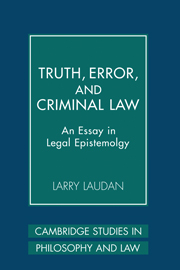1 - Thinking about Error in the Law
Published online by Cambridge University Press: 05 June 2012
Summary
We need hardly say that we have no wish to lessen the fairness of criminal trials. But it must be clear what fairness means in this connection. It means, or ought to mean, that the law should be such as will secure as far as possible that the result of the trial is the right one.
– Criminal Law Revision CommitteeUnderlying the question of guilt or innocence is an objective truth: the defendant, in fact, did or did not commit the acts constituting the crime charged. From the time an accused is first suspected to the time the decision on guilt or innocence is made, our criminal justice system is designed to enable the trier of fact to discover the truth according to law.
– Justice Lewis PowellA Road Map
If we look closely at the criminal justice system in the United States (or almost anywhere else for that matter), it soon becomes evident that there are three distinct families of basic aims or values driving such systems. One of these core aims is to find out the truth about a crime and thus avoid false verdicts, what I will call the goal of error reduction. A second is premised on the recognition that, however much one tries to avoid them, errors will occur from time to time. This goal addresses the question of which sort of error, a false acquittal or a false conviction, is more serious, and thus more earnestly to be avoided.
- Type
- Chapter
- Information
- Truth, Error, and Criminal LawAn Essay in Legal Epistemology, pp. 1 - 26Publisher: Cambridge University PressPrint publication year: 2006

